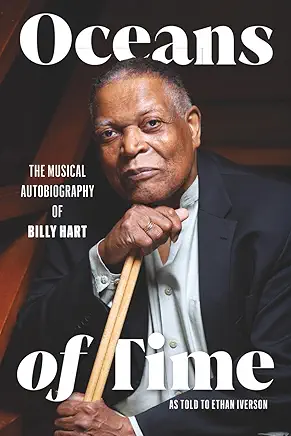
Some years ago I was contracted to develop content for the National Endowment for the Arts NEA Jazz Masters program. For each of the Masters who had been selected up to that point I prepared a condensed biography to which was added discography and bibliography listings. I found myself quite taken aback by the number of these great jazz masters for whom no autobiographies or biographies chronicling their distinguished lives & careers had entered the lexicon. That became part of my motivation for collaborating with NEA Jazz Master Randy Weston on his autobiography African Rhythms (2010 Duke University Press).
Happily this year saw the release of this very fine & informative “Musical Autobiography” of NEA Jazz Master drummer-bandleader-composer Billy Hart. Oceans of Time (2025 Cymbal Press) “As Told To” pianist and longtime Billy Hart Quartet collaborator, pianist-composer-bandleader Ethan Iverson. Quite a fine and informative writer (look for his lively Substack columns), in addition to his obvious piano prowess and high IQ musicality (something that was indelibly driven home for me during his residency several seasons ago at Umbria Jazz’s winter festival in the lovely town of Orvieto), with Oceans of Time Iverson has quite successfully conveyed a true page-turning interpretation of a jazz life beautifully lived by one of the finest drummers of the last half-century, DC’s own Billy Hart. Clearly some questions were in order for Ethan Iverson
When did you first connect with Billy Hart and what were the circumstances?
When I was first collecting jazz records, I noticed that I particularly liked Billy’s drumming. The first album was the Herbie Hancock live album VSOP, where the Mwandishi sextet plays two tunes, and after that first contact, I started collecting records with Billy’s name listed in the credits. When I moved to New York I started seeing Billy play live; in particular I remember a Marc Copland trio gig at Cleopatra’s Needle where I was just mesmerized by Billy. Trombonist Christiphe Schweitzer put Billy and myself together in the late ‘90s for a gig, and that was that, Billy hasn’t been able to get rid of me ever since.
How long have you been a member of the Billy Hart Quartet and how many recordings has that band made?
The 5th album is coming out this month, MULTIDIRECTIONAL, a live recording from SMOKE. We have been together as a quartet for 22 years! Isn’t that incredible. Most groups don’t get so much road time together.
Have you and Billy Hart performed together in any other contexts besides the Quartet?
Once in a while I hire Billy to play trio with me, for example in February I’ll be playing at Birdland with Billy and his long-term associate [bassist] Buster Williams. I really need to be at the top of my game to play with Billy and Buster!
What have been some of the most stimulating and rewarding factors for you and your artistry stemming from performing with Billy Hart?
I don’t know what swing is, but I know everything Billy Hart plays is always incredibly swinging. A universe of beat.
How did you determine that Billy Hart’s story needed to be developed in book form?
He always told amazing stories, and in fact, many people have told me something like, “Thanks so much for enshrining these wonderful tales, which we have all heard before, in a book that will reach the larger community.” On more personal level, I regard Billy as my greatest teacher. In fact, much of my own critical writing on jazz is deeply informed by Billy’s perspective.
When you started this book process were you at all aware that the list of great jazz artist biographies and autobiographies is relatively short?
Yes. The larger arts world has never understood jazz too well. Perhaps it is the double whammy of the music being genuinely mysterious and institutional racism. Thank you Willard, for your collaboration with Randy Weston!
Once the two of you agreed to begin this book process, how did you proceed with Billy?
We had a significant amount of touring lined up for his 80th birthday [Ed. note: now at 84 Billy Hart is still playing oceans of time!], but then the Covid pandemic halted those plans. Instead, we got on Zoom together, and I asked him to go on record, starting from the beginning. I guess there were about 14 hours worth of new video interviews; I also looked at previous interviews and secondary sources. When I started editing the transcript, I kept in mind a favorite jazz memoir, Raise Up Off Me, [pianist] Hampton Hawes as told to Don Asher. Hawes was not a writer but Asher steps out the frame, it really sounds like Hawes is talking; the book is also reasonably short and jam-packed with incident. I tried to follow the Hawes/Asher model for Oceans of Time.
What is your sense of the ultimate value of Oceans of Time in the overall jazz bibliographyy?
That’s not for me to say, but I do think there is one aspect that is at least slightly innovative, which are the third-person footnotes explaining further historical context and the discography that integrates with the book’s text. This is all content that Billy himself would not say, yet is good to know. The research team (myself and two historians, Scott Douglass and George Korval) are able to frame his conversation from an outsider’s perspective, as if we are making a documentary in real time.
The Billy Hart Quartet in action…
